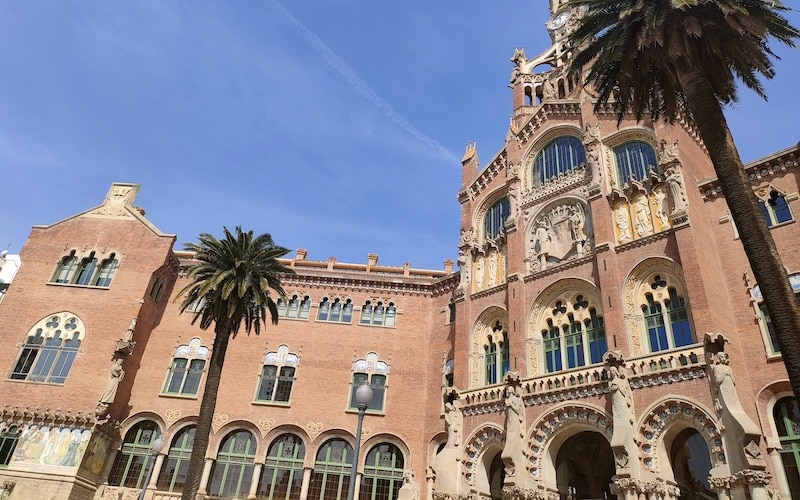As you probably know, I’ve completely fallen in love with art nouveau in Barcelona. This artistic style from 1890-1910 encompasses bright colours and curves predominantly in architecture, art and jewellery. Barcelona is famous for the Art Nouveau of Gaudi and is found in La Sagrada Familia and several houses including Casa Batllo and Casa Mila (La Pedrera). But one of the most impressive examples of Art Nouveau in Barcelona is not a Church or a house….but a hospital! Welcome to Sant Pau Hospital!
Introducing Sant Pau Hospital Barcelona
The full name of Sant Pau is ‘Hospital de la Santa Creu i Sant Pau’. It was built in 1902, at a time of drastic change for Barcelona with the expansion of the city. Barcelona was originally based in the Gothic Quarter – the area was cramped, smelly and without a good sewerage system. And so the city expanded outwards and began to engulf village areas like Gracia. Sant Pau hospital was also built at a time of swift medical advancement and also held a library as a home to a wealth of medical knowledge.
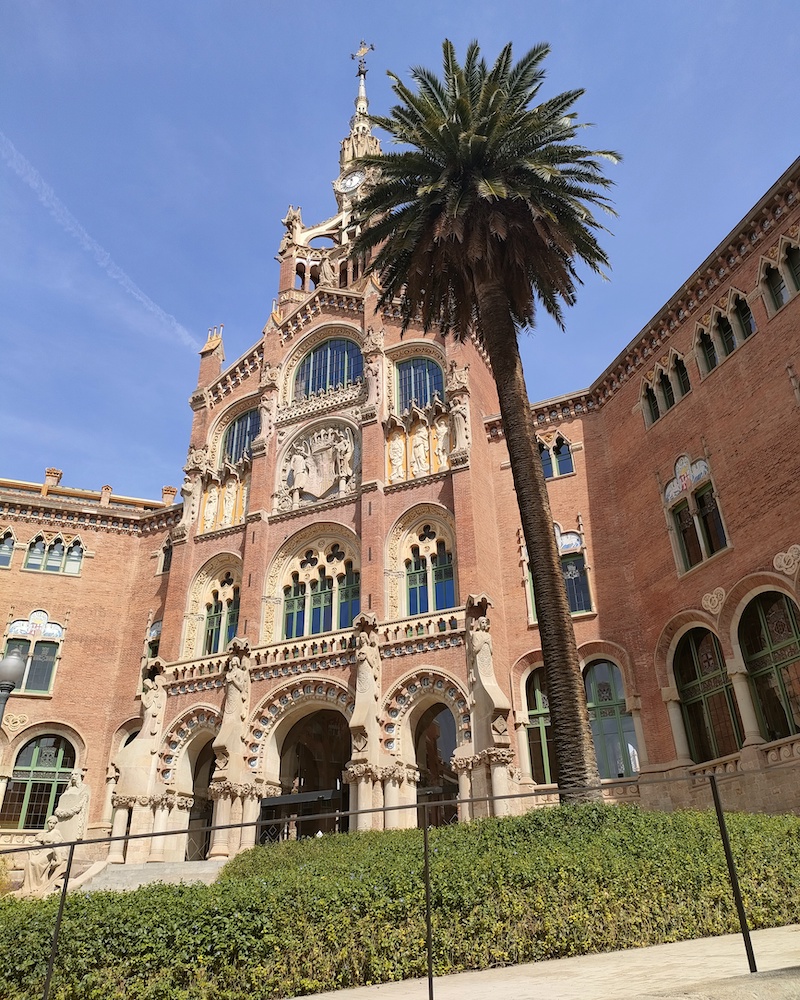
As time went on and more was learnt about hygiene and the transmission of disease, Sant Pau sadly needed to be replaced. By the 21st century a new hospital was needed for a specialism in skincare and care of the sick. New medical headquarters were built. But Sant Pau hospital became a central piece of history here in Barcelona.
Sant Pau was declared a UNESCO World Heritage Site in 1997. In 2009 once all of the patients had been transferred out to the new hospital, the art nouveau site underwent extensive restoration.
When to go to Sant Pau
An excellent time to visit Barcelona is April to June or September to October when the crowds are less busy and the weather is mild. Sant Pau doesn’t get as crowded as other attractions such as Casa Batllo or La Sagrada Familia, so you can comfortably visit anytime of day. However, it’s great to get the first ticket in, so you can get your photography in the courtyard without people!
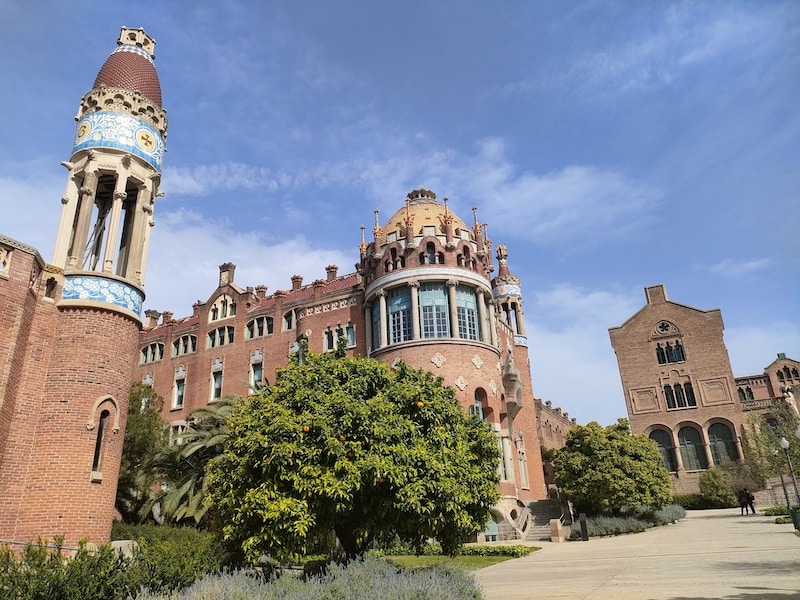
How to get there
The best way to get to Sant Pau is to take the Metro to Sant Pau | Dos de Maig. However, if you are visiting La Sagrada Familia, you can easily walk from there – it takes just 12 minutes. It’s a pleasant walk through Avinguda de Gaudi which is lined with trees and tapas bars!
Where to Stay
To visit Sant Pau and La Sagrada Familia, you can stay in the area of Gracia where it is more peaceful and slightly cheaper than central Barcelona. Here are some suggestions:
- Generator Hostel Barcelona – Excellent if you are Hostelling and travelling on a budget. Walkable to La Sagrada Familia and Sant Pau
- Ibis Barcelona Centro – An excellent Mid range option. A 2* hotel near La Sagrada Familia.
- The One Barcelona – Perfect if you are wanting a high end luxury option. 5* hotel in Gracia with roof top pool.
However, as the city is very well served by the Metro you can get to Sant Pau Hospital from anywhere in the city quite easily.
What to take to Visit Sant Pau
Wear comfortable walking boots as you will be on your feet for some time. Make sure that you take a bottle of water as it can get hot in Barcelona especially in the summer. Take a good camera, preferably one with decent zoom as you will want to take many pictures, especially of the ceilings. It’s probably a good idea to pack a waterproof jacket as well, because the weather can be changeable in Barcelona.
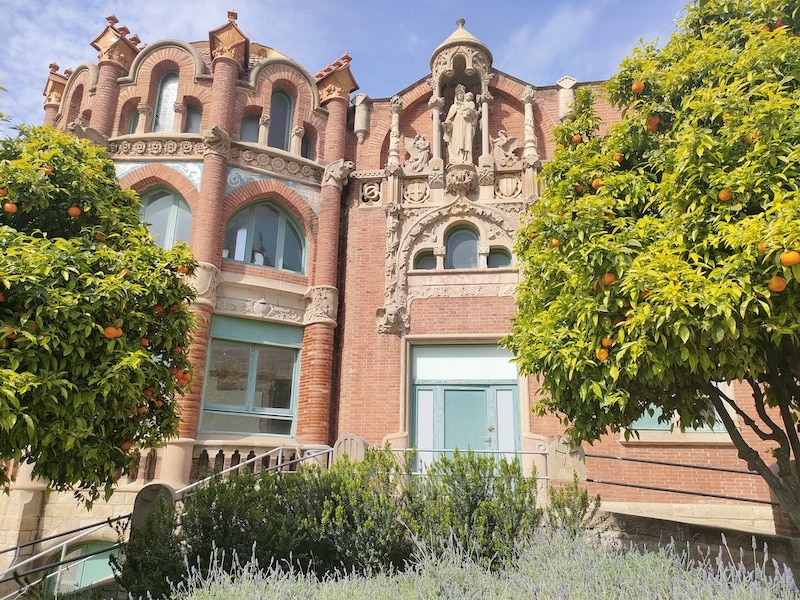
Visiting Sant Pau Hospital
Plan to spend at least an hour or two visiting Sant Pau hospital. There are exhibitions inside and the outside architecture is amazing.
Remember that Sant Pau is a no smoking site and it is not allowed to eat anywhere on the site of Sant Pau hospital.
Tickets
You can book tickets online in advance and the cost is €15 for a self guided tour or €20 for an audio guide tour. I didn’t feel that I really needed the audio guide – there is plenty of information available. Guided visits and tours are also possible to book.
All proceeds generated from ticket sales are used for the continual restoration of the Sant Pau hospital.
Opening times
In the summer months Sant Pau is open from 10 am. to 6.30 pm. When you book a ticket online you can choose your time slot.
Hypostyle Hall
When you first walk into Sant Pau you will come to an ornate hypostyle hall with arches and columns. Would you believe that this used to be an accident and emergency department? Imagine breaking your leg and being brought here…
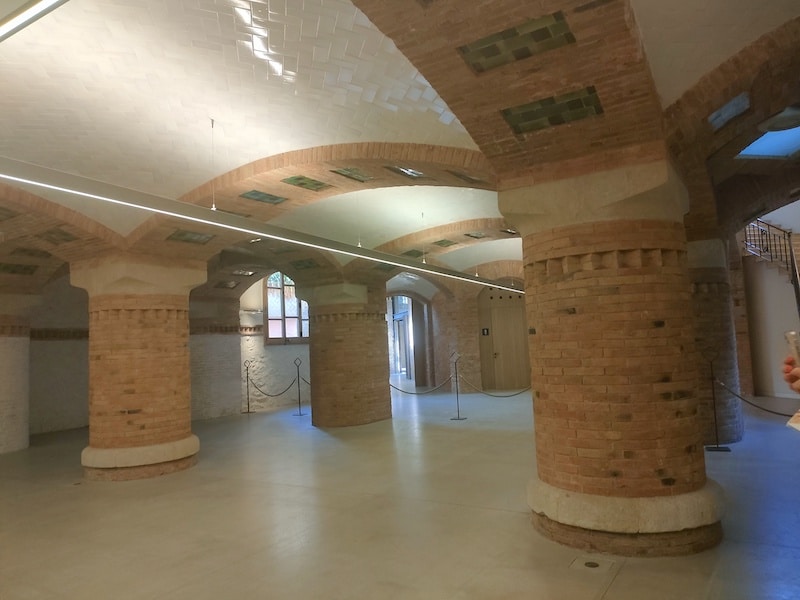
Tunnels and Halls – Sant Salvador Pavilion
A series of tunnels takes you through to a the wards and towers of the main hospital building. What was eerie but fascinating was the way that they had projected figures onto the walls to show you what it was like at the height of its operation. Ghostly figures of porters pushing patients in wheelchairs and doctors running around with their clipboards. The main hall which used to serve as a hospital ward has a luscious green tiled ceiling.
There are several exhibition boards in the main halls to tell you about how the hospital functioned at the time. This includes a video and objects of interest from when the hospital was in operation such as an old stethoscope and asthma inhaler.
The Sant Salvador Pavilion was the very first pavilion to take patients in 1916. It has been painstakingly restored to it’s original appearance and is now dedicated to an exhibition all about the institution and Domènech the architect.
Main Courtyard and views of the hospital buildings
Standing in the courtyard, you will have a phenomenal view of the hospital buildings, Church and surrounding Moorish Gardens. It smells of oranges and heather and is a feast for the senses. Domènech built a city within a city and every aspect of the building was carefully planned, including the angles at which they were built (45 degrees) to allow for the heat of the day and keep patients cool.
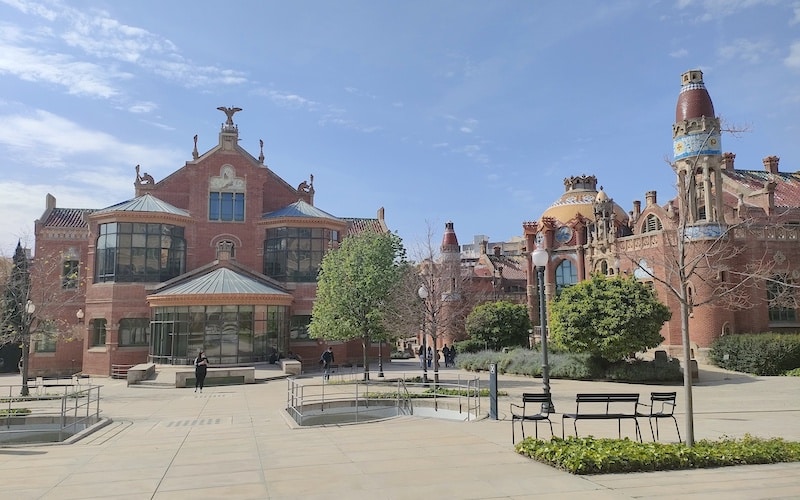
Operations House
The building that you see in the central courtyard directly opposite the entrance (administration pavilion) is Operations House – the main building used for operating on patients. The names of distinguished doctors are carved into the Facade.
The Sant Rafael Pavilion
Sant Rafael Pavilion is an example of a nursing pavilion. It is a historical recreation space that shows you exactly what it was like when it was up and running in the 1920s.It has a long ward and a circular space that was used as a ‘day room’ where patients who were well enough could receive visitors.
Tunnels
You can walk through a set of underground passages which were designed so that the hospital could adequately receive the supplies it needed. his was a complete innovative design for hospitals at the time.
The Purissima Pavilion
This pavilion shows the original volume of the hospital buildings as per Domènech’s design. The space has not yet been restored and demonstrates the complexities of such a vast restoration project.
Administrative Building
The ultimate pinnacle of anyone’s visit is the administrative building, where you end up before the exit. They certainly have saved the best for last.
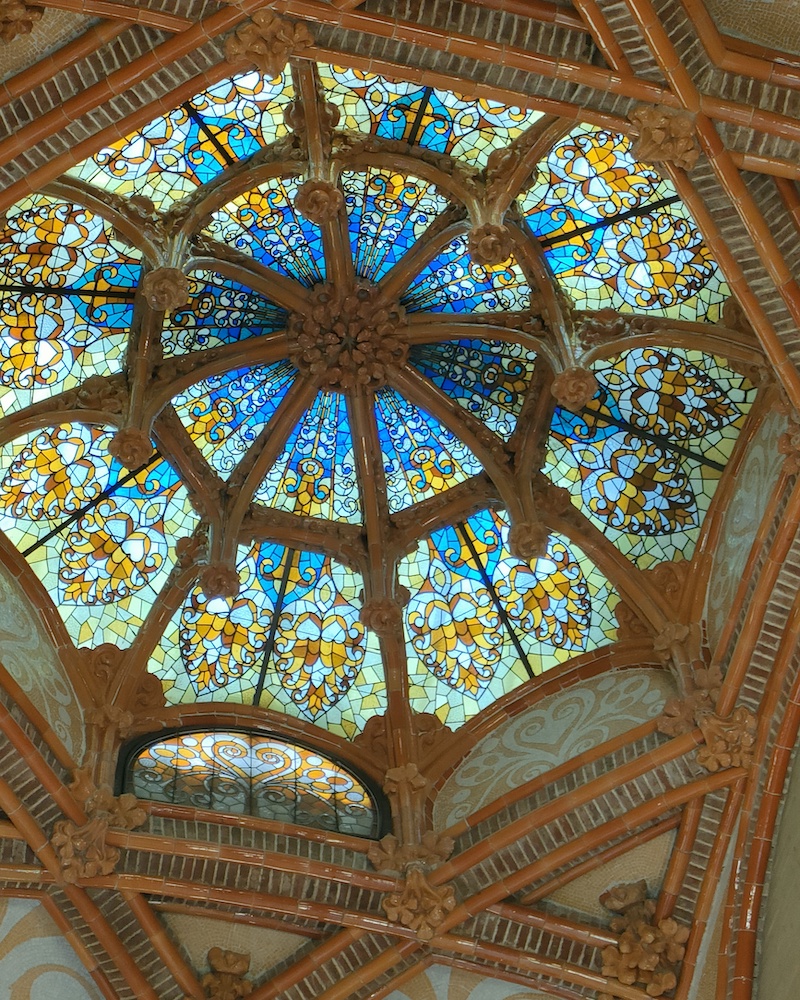
The admin building of Sant Pau is one of the finest examples of Modernisme, the Catalan Art Nouveau style in Barcelona. It is a richly decorated building noted for its striking colours in the ceilings, wall mosaics, stairways and main hall.
Look up, look down, look everywhere!
It’s very Instagrammable!
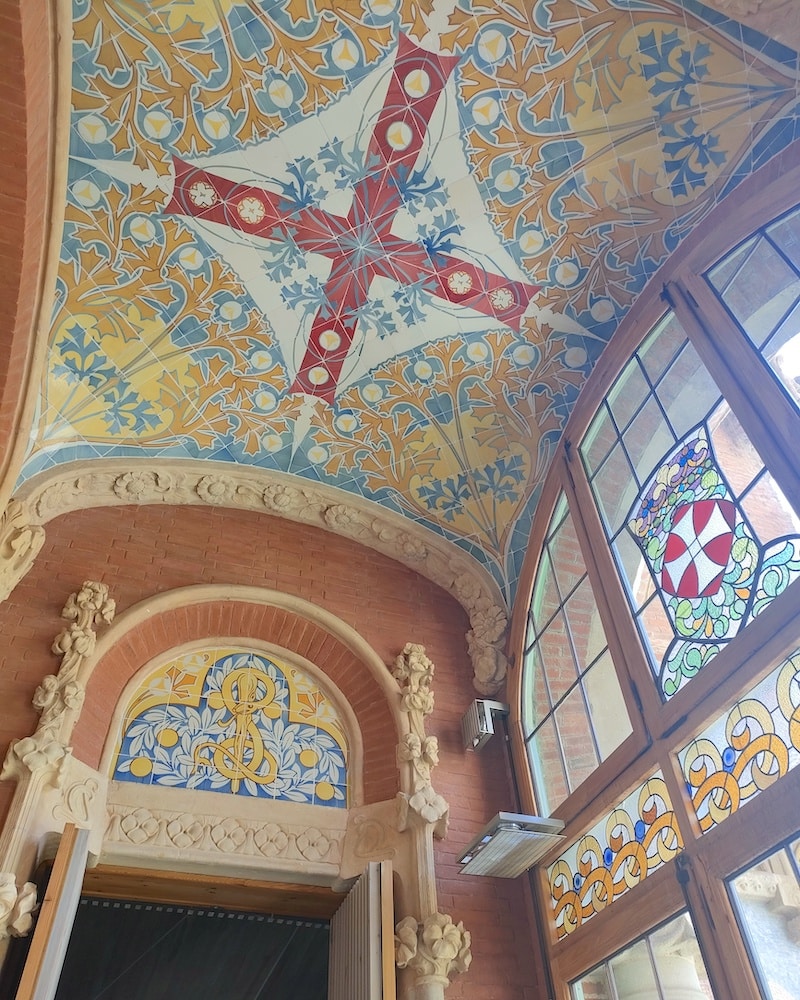
As you leave the Administration building, you will see the magnificant mosaics that are the work of Francesco Lavarta and Mario Maragliano and the facade sculptures of Pau Gargallo.
Visit the official Sant Pau website here.
Further Reading on Barcelona
If you are looking for more ideas on what to see and do in Barcelona, here are a few ideas:
- Things to do in Barcelona at Night – Enjoy Flamenco shows, tapas tours and the Montjuic Magic Fountain!
- Visiting Tibidabo Church – Take the Funicular right up to the best viewpoint in Barcelona and visit a beautiful two-tier church with a Gothic Facade reminiscent of Montmartre in Paris.
- Montserrat Monastery Barcelona – Take a train an hour outside of Barcelona to discover a Monastery on Montserrat Mountain that houses the Black Madonna.

